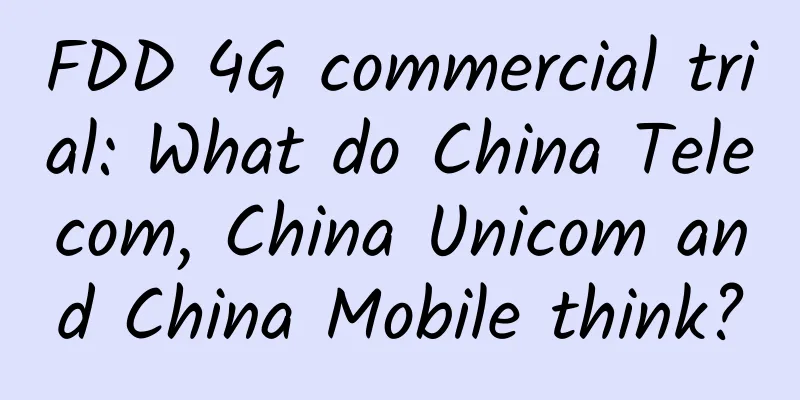FDD 4G commercial trial: What do China Telecom, China Unicom and China Mobile think?

|
At the Tianyi Mobile Phone Trade Fair, when China Telecom Chairman Wang Xiaochu said "two hours later", all the participants applauded and cheered to celebrate the FDD LTE trial network license. Although it is only a small step for 16 cities, it should be considered a big step for China Telecom. China Telecom is happy, China Unicom is mixed From Chairman Wang's smile and passion, it is very clear that China Telecom's senior management is eager for the FDD LTE license. In the previous six months, China Telecom's user base continued to decline, which was described by the media as unprecedented pressure. However, the joy of obtaining the license will eventually fade, and it will dissipate quickly, and the subsequent construction pressure and market competition will follow. In sharp contrast, China Unicom officials did not show too much excitement. Although grassroots employees could hardly suppress their excitement online, the official almost took a cold approach. Some people analyzed that China Unicom still had unused 3G licenses in its hands and did not want to face the three-way competition in the 4G industry chain so soon. At least, a slight delay in time would be more disadvantageous for Telecom to challenge Unicom. China Unicom goes with the flow, while China Telecom goes against the flow. The competition between China Telecom and China Unicom in FDD LTE will intensify. With the same standards and the same industrial chain, the two companies, whose mobile businesses are originally from the same roots, will engage in open and covert fighting. In the FDD competition with China Unicom, China Telecom obviously does not have an advantage, but from now on, it will have the capital to challenge China Unicom. It is no longer an isolated CDMA industrial chain. The WCDMA advantage that China Unicom has been promoting is equivalent to being seized by China Telecom. The development direction of China Telecom is definitely VOLTE, and it will abandon CDMA like American operators. However, the operating environment in China is significantly different from that in the United States. How can China Telecom abandon the CDMA network that it has worked so hard to build? Moreover, VOLTE construction requires a large amount of funds, and the funding issue is the most serious challenge facing China Telecom now. China Telecom and China Unicom are fighting in the same city, while China Mobile is attacking in various places. In the cities with the qualification of building a test network, China Unicom and China Telecom are rolling out at the same time, including Shanghai, Chengdu, Nanjing, Shijiazhuang, Zhengzhou, Shenzhen, Chongqing, Hangzhou, Xi'an, Jinan, Wuhan, etc. In the other five cities, China Telecom is concentrated in the southern cities with strong strength, such as Hefei, Nanchang, Nanning, Lanzhou, and Haikou, while China Unicom is concentrated in the northern cities with strong strength, such as Shenyang and Harbin, as well as Fuzhou, Guangzhou and Changsha in the south. What is thought-provoking is that Guangzhou of China Telecom and Beijing of China Unicom are both shortlisted in the first batch of construction catalogs. Correspondingly, when China Mobile launched the first batch of 6+1 cities of TD-LTE scale trials in 2011, the test cities included: Shenzhen, Hangzhou, Guangzhou, Shanghai, Nanjing, Xiamen, Beijing, and later added Ningbo, Shenyang, Qingdao, Fuzhou, Chengdu, Tianjin, Wuxi, etc. China Mobile will certainly speed up the layout of 4G, especially in the 16 cities where the trial commercial use of FDD network has been announced. China Unicom and China Telecom in these places will face more severe market challenges in the near future, especially in Shenzhen, Hangzhou, Guangzhou, Shanghai, Nanjing, Shenyang, Fuzhou, Chengdu and other cities, which will surely set off a wave of 4G wars. China Telecom and China Unicom are integrating the network, and China Mobile has ulterior motives in applying for the license. Previously, China Mobile also claimed that it was applying for the FDD LTE license, and it had already made preparations for the integration of TDD and FDD networks. The terminal procurement was at least five modes and ten frequencies. It can be said that China Mobile can use the FDD mode at any time when necessary. Small moves by the three operators in the construction of TD LTE and FDD LTE will be inevitable. If China Unicom and China Telecom only use FDD to build networks in some cities, they will inevitably be counterattacked by China Mobile, and the possibility of China Mobile obtaining the FDD license in the future will increase greatly. 4G is destined to be a competition under unified standards. The benefits of license issuance are limited, and operators are not as good as the industry chain. The issuance of FDD LTE licenses, especially the construction permits for test networks in some cities, is only formal for China Telecom and China Unicom. The biggest gain is that they can legitimately promote their so-called FDD advantages, because even if the licenses are not issued, none of the operators are idle. Those who should build networks build networks and those who should release numbers release numbers. The pace of FDD construction has not slowed down at all. This time, the license issuance should be said to be after the media's repeated calls, and the enthusiasm and excitement shown by the media even surpassed China Telecom. The reason is that the FDD LTE industry chain is huge, and domestic and foreign equipment manufacturers, media, consulting companies and experts can't wait. Some people describe that if FDD licenses are not issued, professional communication media will go bankrupt. In fact, it is not that FDD is much ahead of TDD, it is just a simple difference in the technical level, but the distribution of the industry chain is uneven. The issuance of FDD LTE test network licenses is equivalent to giving equipment manufacturers, chip companies and mobile phone manufacturers a reassurance. In this sense, the issuance of FDD test network licenses is more like a nominal feast for the relevant industrial chain. As a winner of Toutiao's Qingyun Plan and Baijiahao's Bai+ Plan, the 2019 Baidu Digital Author of the Year, the Baijiahao's Most Popular Author in the Technology Field, the 2019 Sogou Technology and Culture Author, and the 2021 Baijiahao Quarterly Influential Creator, he has won many awards, including the 2013 Sohu Best Industry Media Person, the 2015 China New Media Entrepreneurship Competition Beijing Third Place, the 2015 Guangmang Experience Award, the 2015 China New Media Entrepreneurship Competition Finals Third Place, and the 2018 Baidu Dynamic Annual Powerful Celebrity. |
<<: Hackers are happy: wearable products may become a new gold mine
Recommend
It has appeared in many places in Hangzhou! A large number of netizens took photos of it: there are as many as 6,000 parasites, which can be fatal in severe cases!
recently, Ms. Yu, who lives in Renhe Jiulong Vill...
The holiday "balance" is insufficient, please check this return safety reminder →
Tips: Your vacation balance is insufficient. As t...
How much does it cost to produce the Chizhou pregnancy and childbirth mini program? Chizhou pregnancy and childbirth mini program production price inquiry
How much is the price for producing Chizhou pregn...
Inventory of essential tools for new media operations (dry goods collection)
We also need to arrange a good-looking layout How...
Create an APP in four months from zero foundation
[[132473]] OK, actually, my title is a bit mislea...
iOS 13: More system apps and components written in Swift
Apple released the new Swift programming language...
Four words you need to understand to do high-level operations
Under the influence of the Internet, traditional ...
"Harbin, you make me feel strange..." What kind of city is Harbin?
In winter, there is a kind of happiness called &q...
Niuqi Academy - A guide for brands to make money on Xiaohongshu, a guide for brands to create hits on Xiaohongshu with annual sales of tens of millions
Niuqi Academy - Brand Xiaohongshu Gold Digging Gu...
Super Fan Pass is online, how to use it? This guide may be the most complete!
On August 23, all Fans Channels were switched to ...
Audi gasoline car "cheating" scandal reappears and has been sued
According to foreign media reports, the Volkswage...
A must-have tool for parents to help their children! Youdao Children's Dictionary is launched in 2019
According to the "Critical Period Hypothesis...
How to create a standard e-commerce live broadcast room at low cost?
If the host is the "face" we see when w...
Do you sneeze when you see the sun? It's your genes that are causing the problem
Sneezing is a normal physiological phenomenon, bu...
Is it expensive to develop a mini program for daily necessities in Zhuhai? Zhuhai daily necessities applet development process and cost
There is no doubt that the topic of mini programs...









